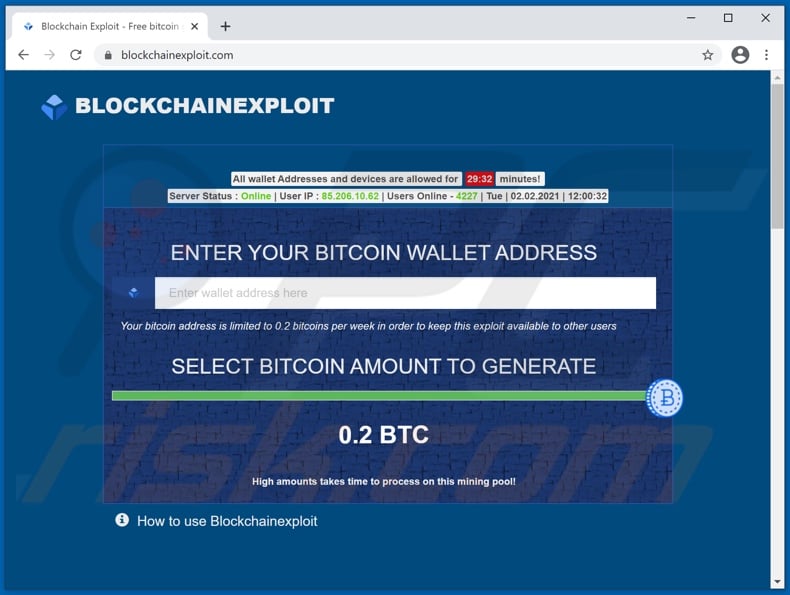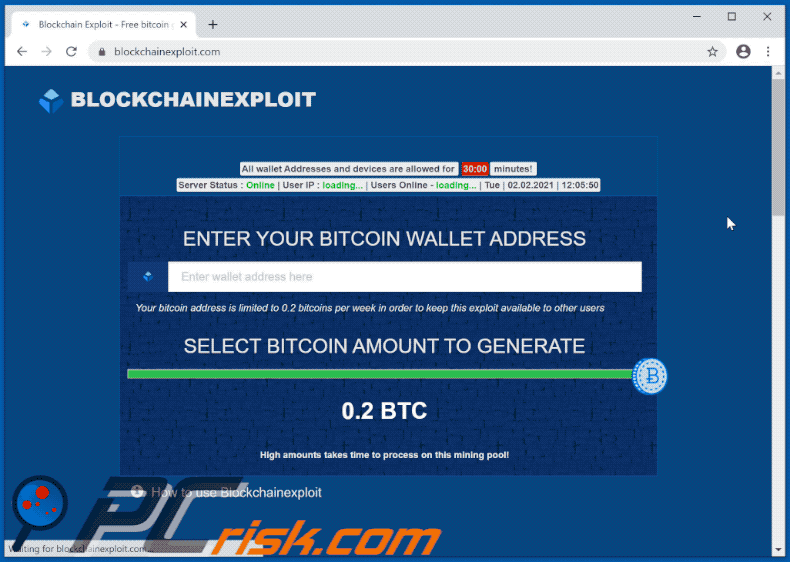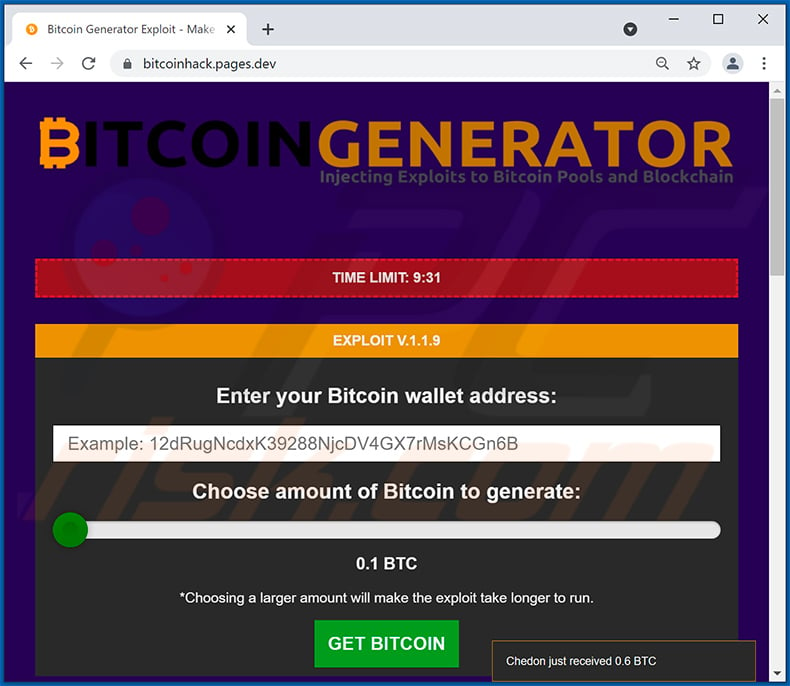Do not visit/use scam websites offering to generate Bitcoins
Phishing/ScamAlso Known As: Generate Bitcoin scam website
Get free scan and check if your device is infected.
Remove it nowTo use full-featured product, you have to purchase a license for Combo Cleaner. Seven days free trial available. Combo Cleaner is owned and operated by RCS LT, the parent company of PCRisk.com.
What is the "Generate Bitcoin" scam?
"Generate Bitcoin" refers to a scam run on various deceptive websites. This scheme invites users to generate up to 0,2 BTC (Bitcoin cryptocurrency) each week for a relatively small fee.
In fact, this scam cannot generate the promised cryptocurrency - its sole purpose is to trick users into transferring Bitcoins to the scammers responsible. Therefore, you are strongly advised against using the fake "Generate Bitcoin" service.
Typically, users access deceptive/scam sites via mistyped URLs, redirects caused by intrusive ads, and by Potentially Unwanted Applications (PUAs).

The "Generate Bitcoin" scam claims that users can have up to 0.2 BTC transferred to their cryptocurrency wallets each week. At the current exchange rate, the sum is equivalent to approximately US$7,000 (USD). Note that exchange rates continually fluctuate.
The supposed weekly limit is necessary to keep the nonexistent exploit available for all users. To have the promised sum transferred to them, users are instructed to enter their cryptowallet addresses.
To have the transaction confirmed, they are informed that they must pay 0,007 BTC (approx. US$25 USD at the current rate) to the cryptocurrency miners enabling the fake exploit. As mentioned, "Generate Bitcoin" is a scam that cannot generate Bitcoins and no funds will be transferred to the users.
Regardless of whether the fee is paid or not, users will not receive the promised cryptocurrency. The requested transaction payment is small in comparison to the promised "profit" - this is intended to make the scam appear worthwhile and lure as many victims as possible.
Thus, by using "Generate Bitcoin", users can only experience financial loss. Cryptocurrencies are of particular interest to scammers/cyber criminals, as related transactions are difficult/impossible to trace. This makes prosecuting the criminals and regaining victims' losses practically impossible.
Furthermore, online schemes like "Generate Bitcoin" often operate in tandem with phishing scams. In other words, users may be requested to provide a variety of sensitive and personal information (e.g., names, surnames, addresses, telephone numbers, email addresses, banking account and credit card details, etc.). The collected data is then sold to third parties and/or used to further other scams. Furthermore, scam victims are targeted continuously by the scammers.
To summarize, by trusting the "Generate Bitcoin" scheme, users can experience financial losses, severe privacy issues and other serious problems.
PUAs are prime suspects behind rogue redirects to untrustworthy, misleading, deceptive/scam, and malicious websites (e.g., ones running the "Generate Bitcoin" scam), however, these applications can have different functionalities, and these functions can be in varied combinations.
Adware-types run intrusive advertisement campaigns (i.e., deliver various ads). The intrusive ads diminish the browsing experience, promote dubious/dangerous sites, and some can even be triggered (when clicked) to stealthily download/install software.
Browser hijackers are another type of PUA. They operate by making modifications to browser settings and restricting/denying access to them in order to promote fake search engines. The promoted web searchers are usually unable to provide search results, and so they redirect to Google, Yahoo, Bing, and other legitimate search engines.
Most PUAs have data tracking capabilities. They monitor browsing activity (browsing and search engine histories) and collect personal information extracted from it (IP addresses, geolocations, and other sensitive details). The gathered data is then monetized by sharing with and/or selling to third parties (potentially, cyber criminals).
In summary, unwanted software can cause system infections, serious privacy issues, financial losses, and even identity theft. To ensure device integrity and user safety, it is crucial to remove all suspicious applications and browser extensions/plug-ins immediately upon detection.
| Name | Generate Bitcoin scam website |
| Threat Type | Phishing, Scam, Social Engineering, Fraud |
| Fake Claim | Scam claims users can have a large Bitcoin sum transferred to them weekly by paying a small fee. |
| Related Domains | blockchainexploit[.]com |
| Detection Names (blockchainexploit[.]com) | Emsisoft (Phishing), Fortinet (Phishing), Certego (Suspicious), Full List Of Detections (VirusTotal) |
| Serving IP Address (blockchainexploit[.]com) | 198.54.115.72 |
| Symptoms | Fake error messages, fake system warnings, pop-up errors, hoax computer scan. |
| Distribution methods | Compromised websites, rogue online pop-up ads, potentially unwanted applications. |
| Damage | Loss of sensitive private information, monetary loss, identity theft, possible malware infections. |
| Malware Removal (Windows) |
To eliminate possible malware infections, scan your computer with legitimate antivirus software. Our security researchers recommend using Combo Cleaner. Download Combo CleanerTo use full-featured product, you have to purchase a license for Combo Cleaner. 7 days free trial available. Combo Cleaner is owned and operated by RCS LT, the parent company of PCRisk.com. |
"BTC giveaway", "Double Your Bitcoins", "TikTok Followers Hack", "Among Us Free Items", and "PayPal Desktop App Scam" are some examples of scams similar to "Generate Bitcoin". The internet is rife with various deceptive/scam sites.
Popular scam models include (but are not limited to): "amazing" deals and offers, fake prize giveaways and raffles, alerts that an essential piece of software is outdated or missing, warnings that the system is infected or at risk, and so on.
Regardless of what these schemes claim, promise or demand, the purpose: to generate revenue for the scammers/cyber criminals behind them.
How did potentially unwanted applications install on my computer?
PUAs are distributed via download/installation set-ups of other products. This deceptive marketing tactic of packing regular software with unwanted or malicious additions is called "bundling".
Rushing download/installation processes (e.g. ignoring terms, skipping steps and settings, etc.) increases the risk of inadvertently allowing bundled content into the system.
Some PUAs have "official" download sites. Intrusive advertisements proliferate these applications as well. Once clicked, they can execute scripts to download/install PUAs without users' consent.
How to avoid installation of potentially unwanted applications
You are advised to research all software before download/installation. Use only official and verified download channels. Unofficial and free file-hosting websites, Peer-to-Peer sharing networks (BitTorrent, Gnutella, eMule), and other third party downloaders commonly offer harmful and bundled content, and are therefore untrusted and should be avoided.
When downloading/installing, read the terms, study all possible options, use the "Custom/Advanced" settings and opt-out of additional apps, tools, features, and so on.
Intrusive advertisements typically seem legitimate, however, they can redirect to dubious and malicious sites (e.g. gambling, pornography, adult-dating, and many others). If you encounter ads or redirects of this kind, inspect the system and remove all dubious applications and browser extensions/plug-ins immediately.
Installed programs must be activated and updated with tools or implemented functions that are provided by the official developers. No other third party, unofficial tools should be used.
Note that it is illegal to activate licensed software with ‘cracking’ tools. Files and programs should be downloaded from official websites and via direct download links. Avoid third party installers and the tools/sources mentioned above.
Do not open website links or files in irrelevant emails that are received from unknown, suspicious addresses. These bogus emails are often disguised as official and important. Regularly, scan your computer with reputable, up-to-date antivirus or anti-spyware software.
If your computer is already infected with PUAs, we recommend running a scan with Combo Cleaner Antivirus for Windows to automatically eliminate them.
Text presented in the "Generate Bitcoin" scam:
Initial page:
BLOCKCHAINEXPLOIT
All wallet Addresses and devices are allowed for 16:49 minutes!
Server Status : Online | User IP : 85.206.10.62 | Users Online - 5134 | Tue | 02.02.2021 | 12:19:03
ENTER YOUR BITCOIN WALLET ADDRESS
Bitcoin
Enter wallet address here
Your bitcoin address is limited to 0.2 bitcoins per week in order to keep this exploit available to other users
SELECT BITCOIN AMOUNT TO GENERATE
0.2 BTC
High amounts takes time to process on this mining pool!
How to use Blockchainexploit
----------------------------------------------
Pop-up:
blockchainexploit
Are you sure that you typed correctly and you want to generate 0.2 BTC to this Bitcoin Address "-"? This operation takes a while and cannot be stopped, check your address twice before confirming.
----------------------------------------------
Last page:
BLOCKCHAINEXPLOIT
All wallet Addresses and devices are allowed for 17:31 minutes!
Server Status : Online | User IP : 85.206.10.62 | Users Online - 4204 | Tue | 02.02.2021 | 12:18:19
Our server generated Bitcoins Successfully
0.2 BTC has been sent to "-"
wallet address.
The Bitcoin network requires a small fee to be paid for each transaction that goes to the miners, else a transaction might never be confirmed.
To ensure your transaction confirms consistently and reliably,
pay the miners fee of 0.007 BTC for this transaction at:
1LqeUv1X9TsLCyxtG3FFRysZkvSFNF3ZJT
BITCOINS GENERATED AND SENT SUCCESSFULLY
Transaction Status: 0/3 Confirmations
The appearance of "Generate Bitcoin" scam (GIF):

Another example of generate Bitcoins-themed scam (bitcoinhack.pages[.]dev):

Text presented within:
TIME LIMIT: 3:34
EXPLOIT V.1.1.9
Enter your Bitcoin wallet address:
Example: 12dRugNcdxK39288NjcDV4GX7rMsKCGn6B
Choose amount of Bitcoin to generate:0.1 BTC
*Choosing a larger amount will make the exploit take longer to run.GET BITCOIN
PEOPLE WHO HAVE RECENTLY USED OUR EXPLOIT
13AsgqJCWQGzH46ihE1JB6SSwpPiToYA1S received 0.5 BTC 6s ago1KAZkZvmqhvUfFnp49m2W9ss57jNTKLgVT received 1.0 BTC 1s ago
Instant automatic malware removal:
Manual threat removal might be a lengthy and complicated process that requires advanced IT skills. Combo Cleaner is a professional automatic malware removal tool that is recommended to get rid of malware. Download it by clicking the button below:
DOWNLOAD Combo CleanerBy downloading any software listed on this website you agree to our Privacy Policy and Terms of Use. To use full-featured product, you have to purchase a license for Combo Cleaner. 7 days free trial available. Combo Cleaner is owned and operated by RCS LT, the parent company of PCRisk.com.
Quick menu:
- What is Generate Bitcoin scam website?
- How to identify a pop-up scam?
- How do pop-up scams work?
- How to remove fake pop-ups?
- How to prevent fake pop-ups?
- What to do if you fell for a pop-up scam?
How to identify a pop-up scam?
Pop-up windows with various fake messages are a common type of lures cybercriminals use. They collect sensitive personal data, trick Internet users into calling fake tech support numbers, subscribe to useless online services, invest in shady cryptocurrency schemes, etc.
While in the majority of cases these pop-ups don't infect users' devices with malware, they can cause direct monetary loss or could result in identity theft.
Cybercriminals strive to create their rogue pop-up windows to look trustworthy, however, scams typically have the following characteristics:
- Spelling mistakes and non-professional images - Closely inspect the information displayed in a pop-up. Spelling mistakes and unprofessional images could be a sign of a scam.
- Sense of urgency - Countdown timer with a couple of minutes on it, asking you to enter your personal information or subscribe to some online service.
- Statements that you won something - If you haven't participated in a lottery, online competition, etc., and you see a pop-up window stating that you won.
- Computer or mobile device scan - A pop-up window that scans your device and informs of detected issues - is undoubtedly a scam; webpages cannot perform such actions.
- Exclusivity - Pop-up windows stating that only you are given secret access to a financial scheme that can quickly make you rich.
Example of a pop-up scam:

How do pop-up scams work?
Cybercriminals and deceptive marketers usually use various advertising networks, search engine poisoning techniques, and shady websites to generate traffic to their pop-ups. Users land on their online lures after clicking on fake download buttons, using a torrent website, or simply clicking on an Internet search engine result.
Based on users' location and device information, they are presented with a scam pop-up. Lures presented in such pop-ups range from get-rich-quick schemes to fake virus scans.
How to remove fake pop-ups?
In most cases, pop-up scams do not infect users' devices with malware. If you encountered a scam pop-up, simply closing it should be enough. In some cases scam, pop-ups may be hard to close; in such cases - close your Internet browser and restart it.
In extremely rare cases, you might need to reset your Internet browser. For this, use our instructions explaining how to reset Internet browser settings.
How to prevent fake pop-ups?
To prevent seeing pop-up scams, you should visit only reputable websites. Torrent, Crack, free online movie streaming, YouTube video download, and other websites of similar reputation commonly redirect Internet users to pop-up scams.
To minimize the risk of encountering pop-up scams, you should keep your Internet browsers up-to-date and use reputable anti-malware application. For this purpose, we recommend Combo Cleaner Antivirus for Windows.
What to do if you fell for a pop-up scam?
This depends on the type of scam that you fell for. Most commonly, pop-up scams try to trick users into sending money, giving away personal information, or giving access to one's device.
- If you sent money to scammers: You should contact your financial institution and explain that you were scammed. If informed promptly, there's a chance to get your money back.
- If you gave away your personal information: You should change your passwords and enable two-factor authentication in all online services that you use. Visit Federal Trade Commission to report identity theft and get personalized recovery steps.
- If you let scammers connect to your device: You should scan your computer with reputable anti-malware (we recommend Combo Cleaner Antivirus for Windows) - cyber criminals could have planted trojans, keyloggers, and other malware, don't use your computer until removing possible threats.
- Help other Internet users: report Internet scams to Federal Trade Commission.
Share:

Tomas Meskauskas
Expert security researcher, professional malware analyst
I am passionate about computer security and technology. I have an experience of over 10 years working in various companies related to computer technical issue solving and Internet security. I have been working as an author and editor for pcrisk.com since 2010. Follow me on Twitter and LinkedIn to stay informed about the latest online security threats.
PCrisk security portal is brought by a company RCS LT.
Joined forces of security researchers help educate computer users about the latest online security threats. More information about the company RCS LT.
Our malware removal guides are free. However, if you want to support us you can send us a donation.
DonatePCrisk security portal is brought by a company RCS LT.
Joined forces of security researchers help educate computer users about the latest online security threats. More information about the company RCS LT.
Our malware removal guides are free. However, if you want to support us you can send us a donation.
Donate
▼ Show Discussion